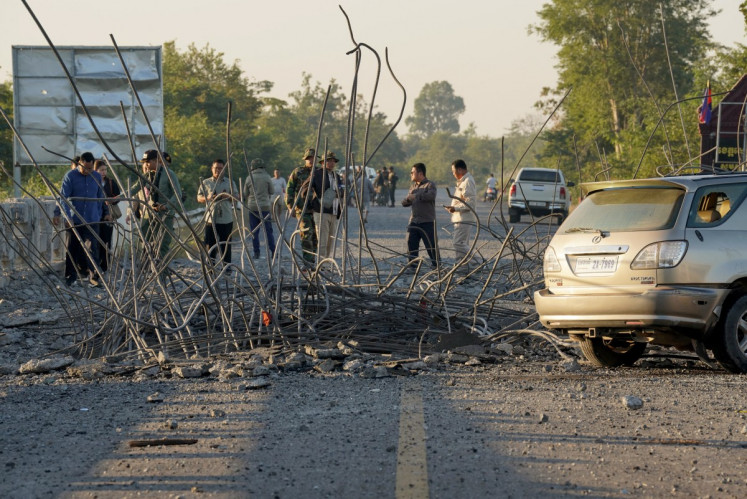Popular Reads
Top Results
Can't find what you're looking for?
View all search resultsPopular Reads
Top Results
Can't find what you're looking for?
View all search resultsCentral Jakarta's Kampung Hijau Berseri promotes green lifestyle
Green neighborhood: Residents of Kampung Hijau Berseri in the East Cempaka Putih subdistrict in Central Jakarta throw waste into one of the composters provided in the neighborhood
Change text size
Gift Premium Articles
to Anyone
G
reen neighborhood: Residents of Kampung Hijau Berseri in the East Cempaka Putih subdistrict in Central Jakarta throw waste into one of the composters provided in the neighborhood. Kampung Hijau Berseri has built itself a good reputation with the community’s efforts to reuse, reduce and recycle trash.(JP/Anggie Angela)
The gates to the neighborhood are covered with vines and many other plants. Trash bins for organic and nonorganic waste are placed approximately 20 steps from each other. The area feels fresh with cool air.
That was the ambience of community unit (RW) 3 in the subdistrict of East Cempaka Putih in Cempaka Putih district, Central Jakarta. The Jakarta administration recently declared the neighborhood a model for shared responsibility in waste management.
Dubbed Kampung Hijau Berseri, everything in the surrounding seems to testify to the community unit’s reputation.
Aan Ardjali, a resident of neighborhood unit (RT) 9 and the former head of RW 3, said the community had been living the green life for a decade.
Although it has been a decade, the community’s focus shifts from time to time. Back then, Aan said, they had focused on campaigning for clean and healthy behavior, which eventually led to the community waste management program.
“It takes a long time to raise awareness in people, and we’ve come a long way to this point,” he told The Jakarta Post.
The program’s main objective was to reduce waste from the area by at least 20 percent. The landfill in Bantar Gebang, Bekasi, is predicted to be overloaded in 2021.
“I heard they receive 7,000 tons of waste a day. We will eventually have to find ways to reduce the amount of waste we generate. And doing that is everyone’s responsibility. We cannot rely on the government alone,” Aan said.
Kampung Hijau Berseri waste management started by simply classifying waste into categories: organic, nonorganic, hazardous and toxic waste.
“Organic waste is obviously from kitchen waste, leftover food, inedible parts of food and foliage. In the hot and dry season like these months, plants tend to shed their leaves so often. We have to sweep the streets more to keep them clean,” Aan explained. “Then we put the organic waste into composters, let it degrade and then we move it to a spacious area to let it dry.”
Aan named another way to reduce waste: enlisting the black soldier fly or Hermetia illucens.
“It takes a long time to raise awareness in people, and we’ve come a long way to this point.”
Rita Septiani, another resident, is in charge of the flies and their larvae. She keeps them in a small house with mesh around it.
“Roughly, a kilogram of larvae can process 3 to 5 kilograms of organic waste,” she said.
“However, you have to pay attention to the larvae’s color. The amount of waste they can process depends on their color: The light-colored ones are the early-stage ones and the dark ones will eventually eat less waste and become cocoons. Then they will become flies, lay eggs and produce more larvae.”
Rita also manages some of the composters in the area.
“We turn the organic waste into fertilizer for the plants we grow.”
The community area also grows its own fruits, herbs and spices, along with various kinds of fish to prevent unnecessary packaging waste.
“We have decided to start cultivating food that can be produced at home. If you buy it at the large markets, they sell it in nondegradable packaging that you will throw out,” said Aan, while showing The Jakarta Post what kind of plants the community is producing. Some of the notable ones are spinach, water spinach, passion fruit, grape, aloe vera, capsicum and grass jelly vines.
One of the residents even watered the plants with pet’s secretion to suppress clean water usage as the community faces water scarcity too.
Managing nonorganic and toxic waste is another story. Nonorganic waste like plastic bottles and cups is usually refashioned into handicraft.
“You can see on the gates; we have decoration made from plastic bottles. Plastic cups can be used […] for our hydroponic farm,” Aan said, pointing out the mentioned material as he walks around the area.
“We have a waste bank, too, as a way to separate nonorganic waste. People put their plastic bottles, cardboard, glass bottles and much more in the waste bank.”
As for hazardous and toxic materials and other nonreusable, nonorganic waste, the community sends it to the temporary disposal site.
“Once every few days, someone will pick up the rest of the waste and deliver it to the nearest disposal site, where it can be processed beyond our capabilities.”
According to their observation, Aan and Rita both admitted some of their fellow residents were not fully committed to the lifestyle of the program.
“Convincing people to get into this kind of lifestyle is a challenge, but as long as you have will and consistency in doing so, you will eventually inspire others. Raising awareness about facts and warning people about the foreseeable future can work too,” Aan said.
“Just do whatever you are doing. If you’re doing the right thing, like a ripple, some good will come out of it,” Rita added.
— The writer is an intern at The Jakarta Post










